Oedipus – Tragic Prophecy About A Man Who Couldn’t Escape Fate
Ellen Lloyd - AncientPages.com - What would you do if you learned something terrible would happen to you and your family? Most of us would do what Oedipus tried, change the course of events. But is it possible?
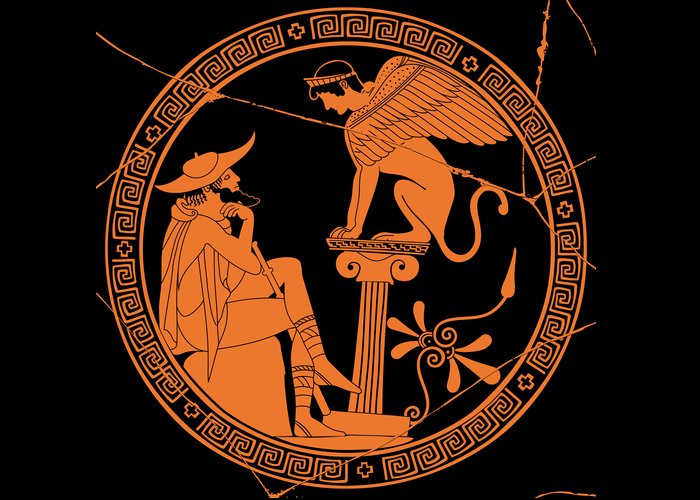 Oedipus managed to solve the sphinx's riddle. Image: Stock photo
Oedipus managed to solve the sphinx's riddle. Image: Stock photo
Many great ancient thinkers have long wondered whether our lives are pre-determined or if we have free will. It's a subject that still interests modern scholars and a philosophical question that fascinates many people. In the case of the mythical King Oedipus, it was impossible to escape fate.
The tragic prophecy about Oedipus shows we cannot escape fate no matter how much we try.
The legend of Oedipus was mentioned by several ancient Greek poets such as Homer, Hesiod, Pindar, Aeschylus, and Euripides. The most popular version of the story comes from Sophocles' Oedipus Rex (or Oedipus the King) and Oedipus at Colonus. It's a dramatic story that still captivates the modern world.
Tragic Prophecy Foretold By The Oracle In Delphi
Oedipus' troublesome life started as soon as he was born. His father, King Laius, and mother, Queen Jocasta of Thebes, learned from the oracle in Delphi that their son would kill them. In ancient Greece, prophecies foretold by prophets were respected and treated very seriously by mortal humans and by gods who relied on their guidance and wanted to learn about future events.
So naturally, they were terrified when King Laius and Queen Jocasta learned that their son would kill them. They left the newborn child on a mountain to die.
Oedipus was lucky, at least for a short while. He was raised by Polybus, king of Corinth, and his queen, Merope, who adopted him because they couldn't have any children. Shortly after having been abandoned, some shepherds found little Oedipus, who took him to the city of Corinth.
Then, one day, Oedipus was told by a drunk man that he was just a "bastard" and not the biological son of Polybus and Merope. Oedipus asked his parents if this was true, but they denied this. Not being able to get the thought out of his mind, a devastated Oedipus decided he must know the truth about his parents. So, he went to the Oracle in Delphi to get some answers.
 Oedipus explains the riddle of the Sphinx, by Jean Auguste Dominique Ingres, c. 1805. Image credit: Public domain
Oedipus explains the riddle of the Sphinx, by Jean Auguste Dominique Ingres, c. 1805. Image credit: Public domain
But the oracle told him something even more shocking. Instead of revealing his origins, he was told that his fate was to kill his father and mother.
Of course, Oedipus thought the oracle was referring to Polybus and Merope. He had no intention of killing the two people who had raised him. To avoid his fate, Oedipus decided to go on a long journey instead of returning to his home in Corinth.
Oedipus' Encounter With King Laius And A Sphinx
One day, on his journey, Oedipus met an older man driving a chariot in the opposite direction. The man was rude and demanded that Oedipus move out of the way so he could pass with his chariot.
An argument broke out between the two men, and they fought over who had the right to go first. It ended with Oedipus killing the man.
When Oedipus reached Thebes, he learned about the existence of a horrifying sphinx that stopped all travelers and asked them a riddle. According to some versions of the story, the sphinx ate the children of Thebes daily. If someone couldn't solve the mystery, they would be killed and eaten, but if they provided the correct answer, the sphinx allowed them to continue their journey.
When Oedipus confronted the sphinx, the animal gave him a riddle. The sphinx asked: "What walks on four feet in the morning, two in the afternoon, and three at night?". Oedipus answered: "Man: as an infant, he crawls on all fours; as an adult, he walks on two legs and; in old age, he uses a 'walking' stick."
 Prophet Tiresias told Oedipus the truth. Credit: Public Domain
Prophet Tiresias told Oedipus the truth. Credit: Public Domain
It was not an easy riddle to solve, but Oedipus was the first to give a correct answer, allowing him to continue his journey.
Oedipus' Marriage To Queen Jocasta Fulfilled The Prophecy
When Queen Jocasta, who was recently widowed, learned how Oedipus solved the sphinx's riddle, she was so impressed that she wanted to marry him. Together they had two sons, Eteocles and Polynices, and two daughters, Antigone and Ismene.
Could it be that possible that Oedipus had escaped fate? Had he been told a false prophecy?
Oedipus lived as a happy man for many years, but then he met prophet Tiresias whose words changed everything. Prophet Tiresias revealed to Oedipus that the man driving the chariot he had killed before had been his biological father, King Laius. Oedipus also learned that the woman he was now married to, Queen Jocasta was his biological mother. The marriage between Oedipus and Queen Jocasta fulfilled the rest of the prophecy, but none of them knew this at that point.
When Queen Jocasta learned the truth, she committed suicide. Oedipus took a pin from a brooch and stuck out his eyes. As a blind man, he spent the rest of his life in exile. He became a beggar, and his daughter Antigone was the only one who accepted him as he wandered through the country.
Nothing could comfort Oedipus anymore. He was a sad man who had lost all hope. When Oedipus visited the oracle in the city of Colonus near Athens, he was told that his death was approaching soon
 Oedipus at Colonus. Painting by Jean-Antoine-Théodore Giroust at the Dallas Museum of Art. Image credit: Public domain
Oedipus at Colonus. Painting by Jean-Antoine-Théodore Giroust at the Dallas Museum of Art. Image credit: Public domain
And so, it happened, Oedipus died at Colonus. He was taken to the underworld, where he became a guardian hero of the land.
The story of Oedipus is slightly different depending on which author you read. According to another version, Oedipus died in a cave.
Many have written about the tragedy of the King of Thebes. Even Julius Caesar wrote a play on Oedipus, but the literary piece hasn't survived.
This classical ancient Greek tragedy raises many vital questions. The story's main topic is fate and free will, the conflict between the individual and the state, and people's willingness to ignore the truth.
Sigmund Freud introduced the Oedipus complex to describe a child's desire for their opposite-sex parent and jealousy and anger toward their same-sex parent. However, the term is slightly misleading because Oedipus did not know he had married his mother. It was revealed to him much later.
Written by Ellen Lloyd – AncientPages.com
Updated on January 5, 2023
Copyright © AncientPages.com All rights reserved. This material may not be published, broadcast, rewritten or redistributed in whole or part without the express written permission of AncientPages.com
Expand for referencesMore From Ancient Pages
-
 3rd-Century Statue Discovered In Ancient City Of Perge, Antalya, Turkey
Archaeology | Jul 28, 2020
3rd-Century Statue Discovered In Ancient City Of Perge, Antalya, Turkey
Archaeology | Jul 28, 2020 -
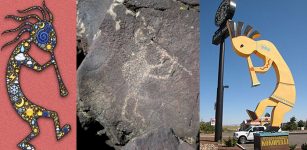 Kokopelli – Popular Trickster God Of The American Southwest Brought Happiness To People
Featured Stories | May 11, 2020
Kokopelli – Popular Trickster God Of The American Southwest Brought Happiness To People
Featured Stories | May 11, 2020 -
 Vikings’ Encounters With Peculiar White-Dressed Humanoids And Cave Dwellers In Unknown Lands Described In Norse Sagas
Featured Stories | Sep 5, 2024
Vikings’ Encounters With Peculiar White-Dressed Humanoids And Cave Dwellers In Unknown Lands Described In Norse Sagas
Featured Stories | Sep 5, 2024 -
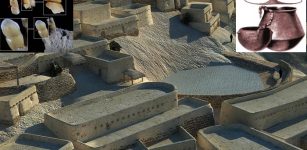 4,000 Years Ago Women Of El Argar Used Their Teeth As Tools
Archaeology | Nov 10, 2020
4,000 Years Ago Women Of El Argar Used Their Teeth As Tools
Archaeology | Nov 10, 2020 -
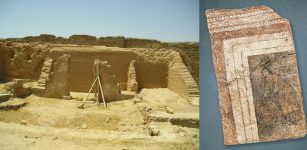 Has World’s Oldest Image Of Virgin Mary Been Discovered In Dura-Europos Church?
Archaeology | Mar 17, 2017
Has World’s Oldest Image Of Virgin Mary Been Discovered In Dura-Europos Church?
Archaeology | Mar 17, 2017 -
 Four Roman-Era Brooches And A Ring Found In The Borki Forest, Poland
Archaeology | Mar 15, 2024
Four Roman-Era Brooches And A Ring Found In The Borki Forest, Poland
Archaeology | Mar 15, 2024 -
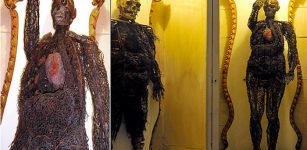 Incredible Anatomical Human Machines – Two Fleshless Bodies Mystery
Featured Stories | Jul 24, 2018
Incredible Anatomical Human Machines – Two Fleshless Bodies Mystery
Featured Stories | Jul 24, 2018 -
 7,000-Year-Old Kilns From Ceramics Workshop Unearthed In Northeast Bulgaria
Archaeology | Nov 20, 2020
7,000-Year-Old Kilns From Ceramics Workshop Unearthed In Northeast Bulgaria
Archaeology | Nov 20, 2020 -
 25,000 Ancient Egyptian Statues, Ushabti Figurines And Artifacts From New Kingdom Cemetery Revealed For The First Time
Archaeology | Oct 26, 2023
25,000 Ancient Egyptian Statues, Ushabti Figurines And Artifacts From New Kingdom Cemetery Revealed For The First Time
Archaeology | Oct 26, 2023 -
 Time Capsule – Best Preserved 3,000-Year-Old Dwelling Ever Found In Britain
Archaeology | Jan 12, 2016
Time Capsule – Best Preserved 3,000-Year-Old Dwelling Ever Found In Britain
Archaeology | Jan 12, 2016 -
 Evidence Vikings Had Windows With Glass Panes Already Between 800 And 1100
Archaeology | Oct 11, 2023
Evidence Vikings Had Windows With Glass Panes Already Between 800 And 1100
Archaeology | Oct 11, 2023 -
 Thor’s Hammer Pendant Found In Norfolk May Be Linked To The Great Heathen Army
Archaeology | Oct 24, 2023
Thor’s Hammer Pendant Found In Norfolk May Be Linked To The Great Heathen Army
Archaeology | Oct 24, 2023 -
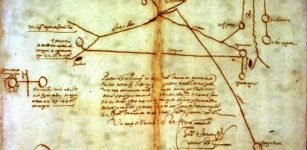 Etzanoa: Long-Lost Native American City Discovered In Kansas After 400 Years
Archaeology | Apr 24, 2017
Etzanoa: Long-Lost Native American City Discovered In Kansas After 400 Years
Archaeology | Apr 24, 2017 -
 Early City Planning In The Kingdom Of Judah Examined
Archaeology | Jul 5, 2023
Early City Planning In The Kingdom Of Judah Examined
Archaeology | Jul 5, 2023 -
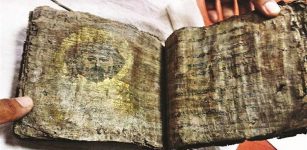 A Millennium-Old Gilded Bible Seized In Tokat, Turkey
Archaeology | Oct 28, 2015
A Millennium-Old Gilded Bible Seized In Tokat, Turkey
Archaeology | Oct 28, 2015 -
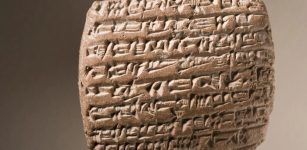 Locations Of 11 Lost Ancient Cities Revealed On 4,000-Year-Old Artifacts
Archaeology | Nov 15, 2017
Locations Of 11 Lost Ancient Cities Revealed On 4,000-Year-Old Artifacts
Archaeology | Nov 15, 2017 -
 Mysterious 7,000-Year-Old Circular Structure Near Prague Investigated By Scientists
Archaeology | Sep 14, 2022
Mysterious 7,000-Year-Old Circular Structure Near Prague Investigated By Scientists
Archaeology | Sep 14, 2022 -
 Face Of Very Old “Vampire” Buried In Connecticut Reconstructed
Archaeology | Nov 9, 2022
Face Of Very Old “Vampire” Buried In Connecticut Reconstructed
Archaeology | Nov 9, 2022 -
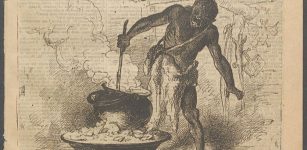 Obeah: Who Were The Feared Shadow Killers Of Jamaica?
Ancient Traditions And Customs | Sep 24, 2018
Obeah: Who Were The Feared Shadow Killers Of Jamaica?
Ancient Traditions And Customs | Sep 24, 2018 -
 Ancient Roman Sandal With Nails And Game Pieces Found Under A Playground In Germany
Archaeology | Nov 22, 2024
Ancient Roman Sandal With Nails And Game Pieces Found Under A Playground In Germany
Archaeology | Nov 22, 2024
